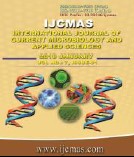


 National Academy of Agricultural Sciences (NAAS)
National Academy of Agricultural Sciences (NAAS)

|
PRINT ISSN : 2319-7692
Online ISSN : 2319-7706 Issues : 12 per year Publisher : Excellent Publishers Email : editorijcmas@gmail.com / submit@ijcmas.com Editor-in-chief: Dr.M.Prakash Index Copernicus ICV 2018: 95.39 NAAS RATING 2020: 5.38 |
In vermicomposting, variation in particle size, palatability and metabolites of solid organic wastes may influence the performance of earthworm as well as quality of its final product. Therefore, the study was taken to characterize the vermicomposts prepared from two different sources i.e. water hyacinth and coconut leaf respectively. Vermicompost of water hyacinth and coconut leaf showed almost similar pH and EC values by Jackson method (1973) but these showed higher in FCO method (1985). CEC value for both vermicompost was 74.20 and 72.60 cmol (+) kg-1. The Organic carbon content (23.1%) was recorded in water hyacinth vermicompost while as coconut leaf vermicompost (22.5%). Water holding capacity was much higher (213.90 and 226.2%) as compare to cultivated soil. Available form of N, P, K, S, Zn, Cu, Mn and Fe was found in less content with respect to total K and Na content in both types of vermicompost. Available part of the nutrients was more pronounced in water hyacinth vermicompost than coconut leaf vermicompost while as microbial population was accounted higher in water hyacinth vermicompost than coconut leaf vermicompost respectively. Water hyacinth vermicompost contains higher values of dehydrogenase activity, microbial biomass carbon content as well as urease enzyme activity. Results represented that water hyacinth vermicompost is better in quality than coconut leaf vermicompost with respect to its microbial properties.
 |
 |
 |
 |
 |